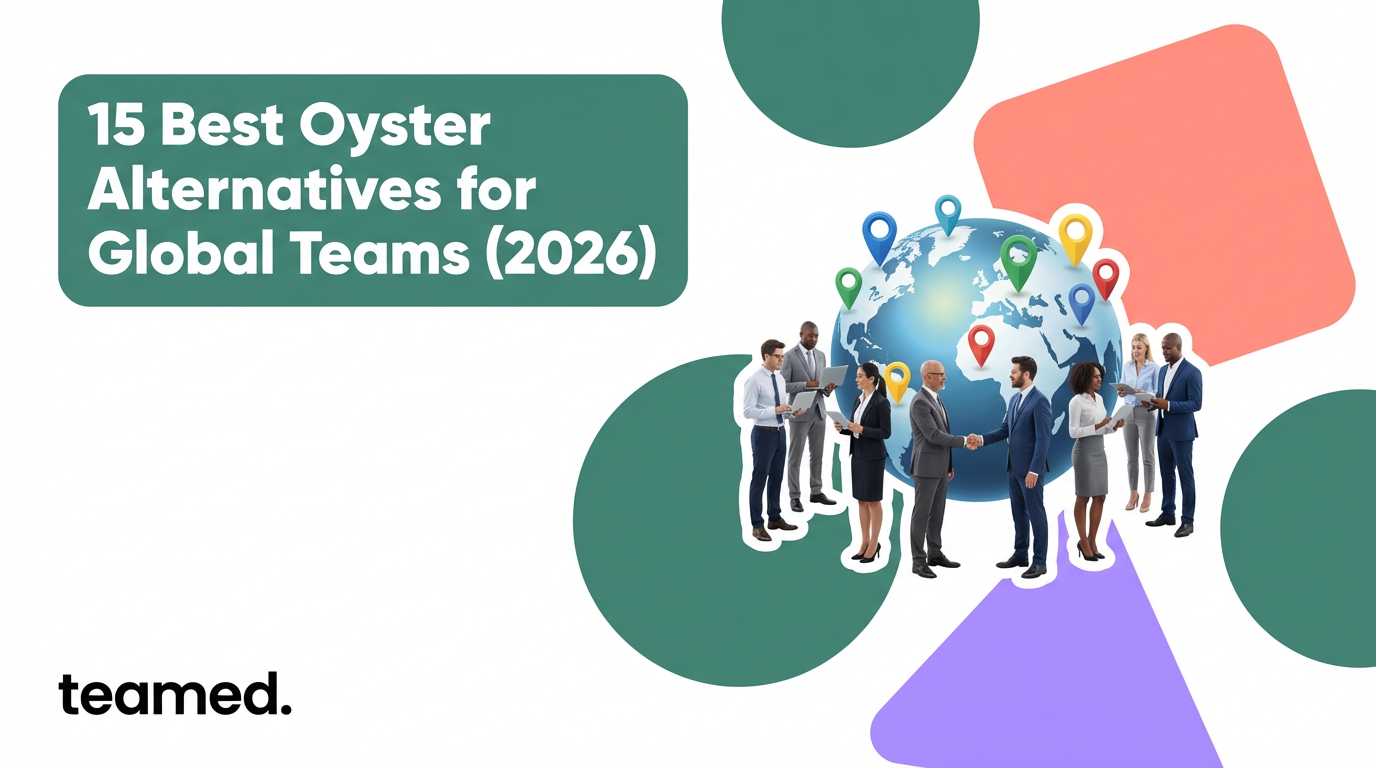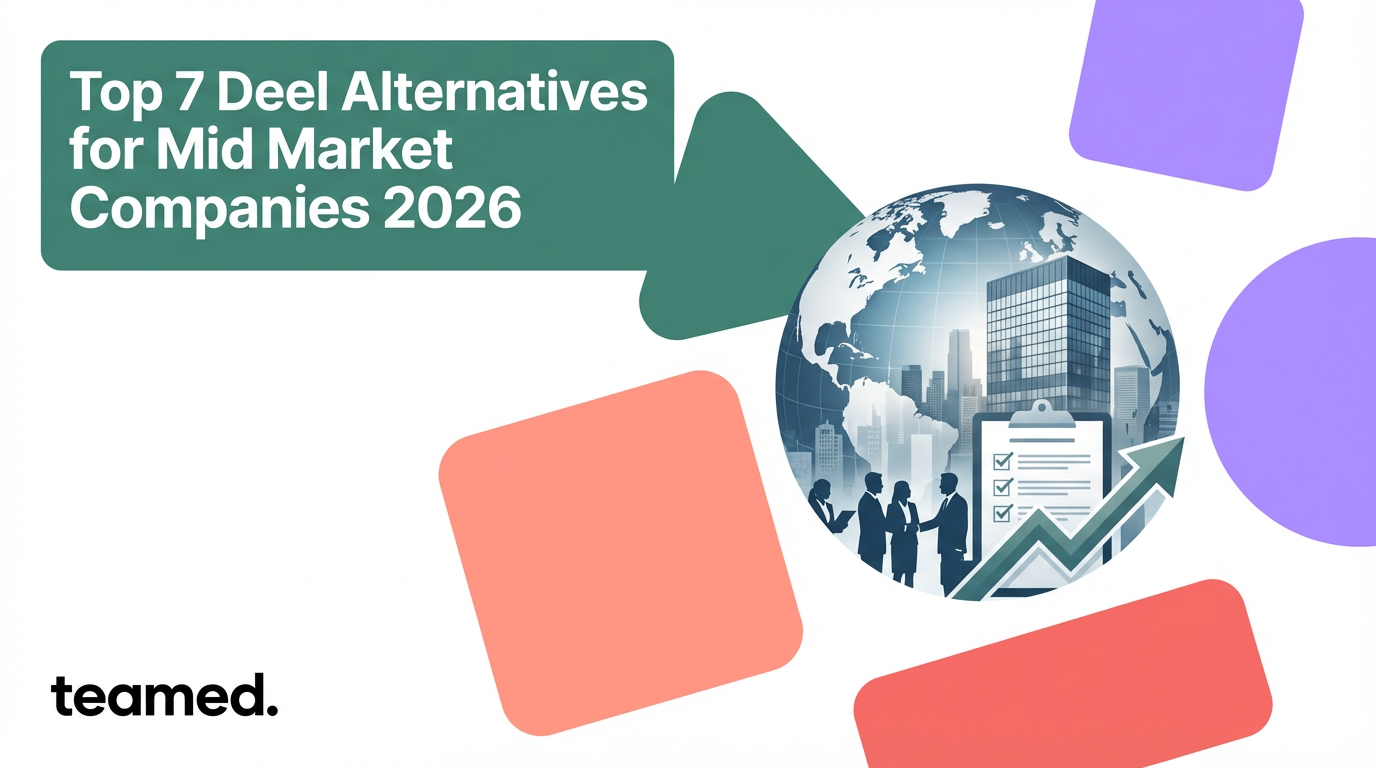Key takeaways: What is an EOR?
- An Employer of Record (EOR) lets you legally hire and pay global employees without setting up a local entity to save time and reduce risk.
- Choosing the right EOR provider starts with understanding your hiring goals, compliance needs, and desired level of support. Because not all EORs offer the same coverage, transparency, or expertise.
- A quality EOR unlocks faster, compliant hiring, and smoother market entry. Use one to grow confidently while protecting yourself against legal and financial risk.
- Teamed is the EOR built for mid-sized and scaling companies — combining AI automation with hands-on experts, transparent pricing, and 24/5 human support.
What is an Employer of Record (EOR)?
An Employer of Record (EOR) is a third-party organization that legally employs workers on behalf of your company.
While you still control day-to-day operations, the EOR takes care of the admin, legal, and compliance aspects of employment.
But you still get an overview of everything going on using a service like Teamed:
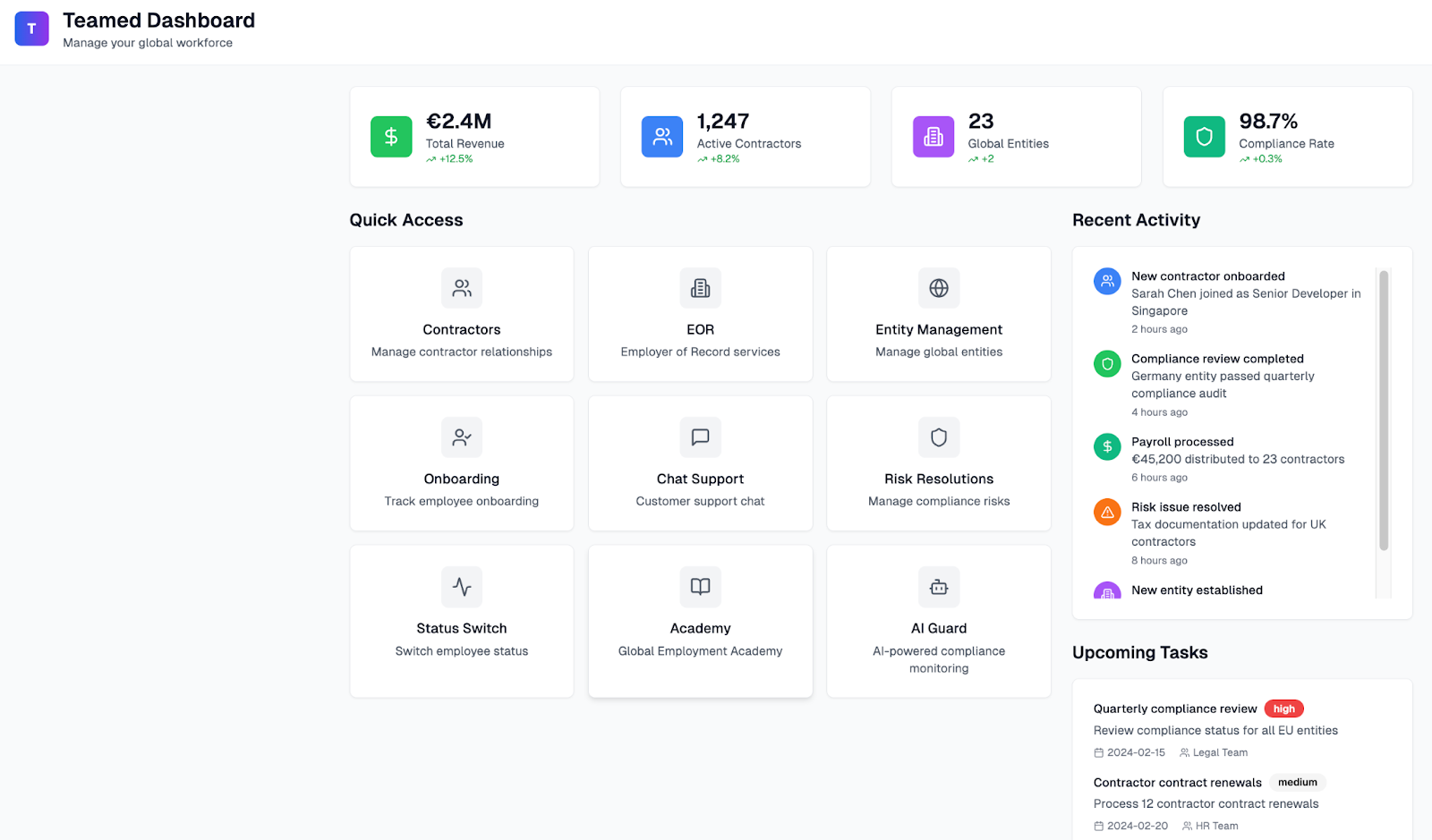
For mid-sized companies expanding globally, this setup removes a huge amount of friction.
Imagine you’re a 250-person SaaS company based in the US that’s found the perfect marketing lead in Germany.
When you partner with an EOR, it becomes the marketing lead’s legal employer. But you still manage their goals, workload, and culture like any other team member.
Here’s how an EOR relationship typically works:
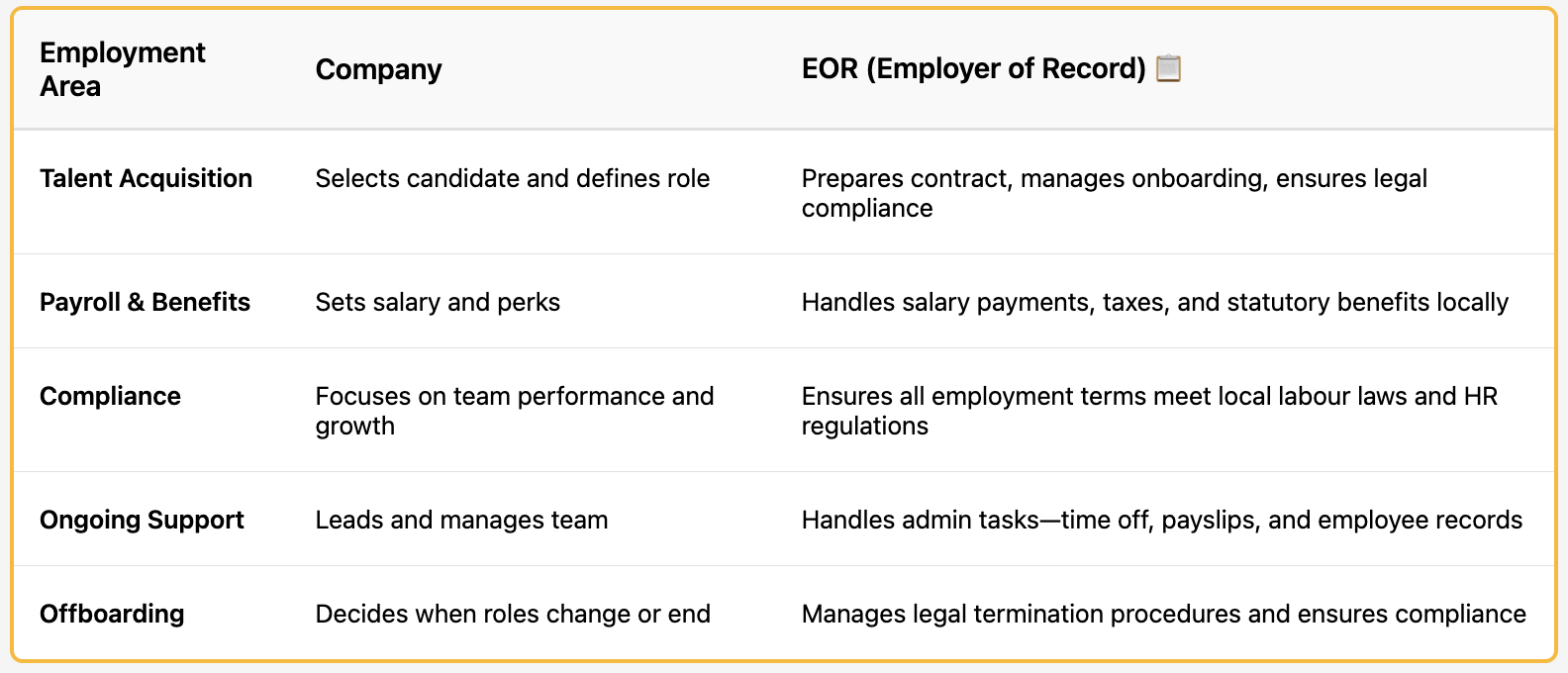
An EOR lets you hire without dealing with complex labour laws or worrying about compliance mistakes.
EOR vs. a PEO vs. a staffing agency
If you’ve never worked with an EOR before, it’s easy to confuse it with other HR outsourcing options like a PEO (Professional Employer Organisation) or a staffing agency.
However, each solves very different problems.
Here’s how the three service providers compare:
Scaling internationally, but don’t want to set up permanently in one place yet?
An EOR lets you hire from a global talent pool and pay them legally — while saving time and money and eliminating risk.
💡Pro tip: Teamed makes this process easier through its GEMO (Global Entity Management Operations) offering. Start with an EOR and seamlessly graduate to entity management when the time is right — no rehiring or disruptions.
What are the benefits of a quality EOR service?
A global EOR helps you hire faster, test new markets (without committing a huge amount of time or money), and ensure compliant employment.
Here are three of the biggest advantages:
Faster global hiring
International hiring through an EOR solution is often weeks (or even months) faster than doing it alone.
According to SmartRecruiters’ research, the global median time to hire is 38 days. But companies using artificial intelligence (AI) in their hiring processes (as many EORs do) can hire 26% faster.
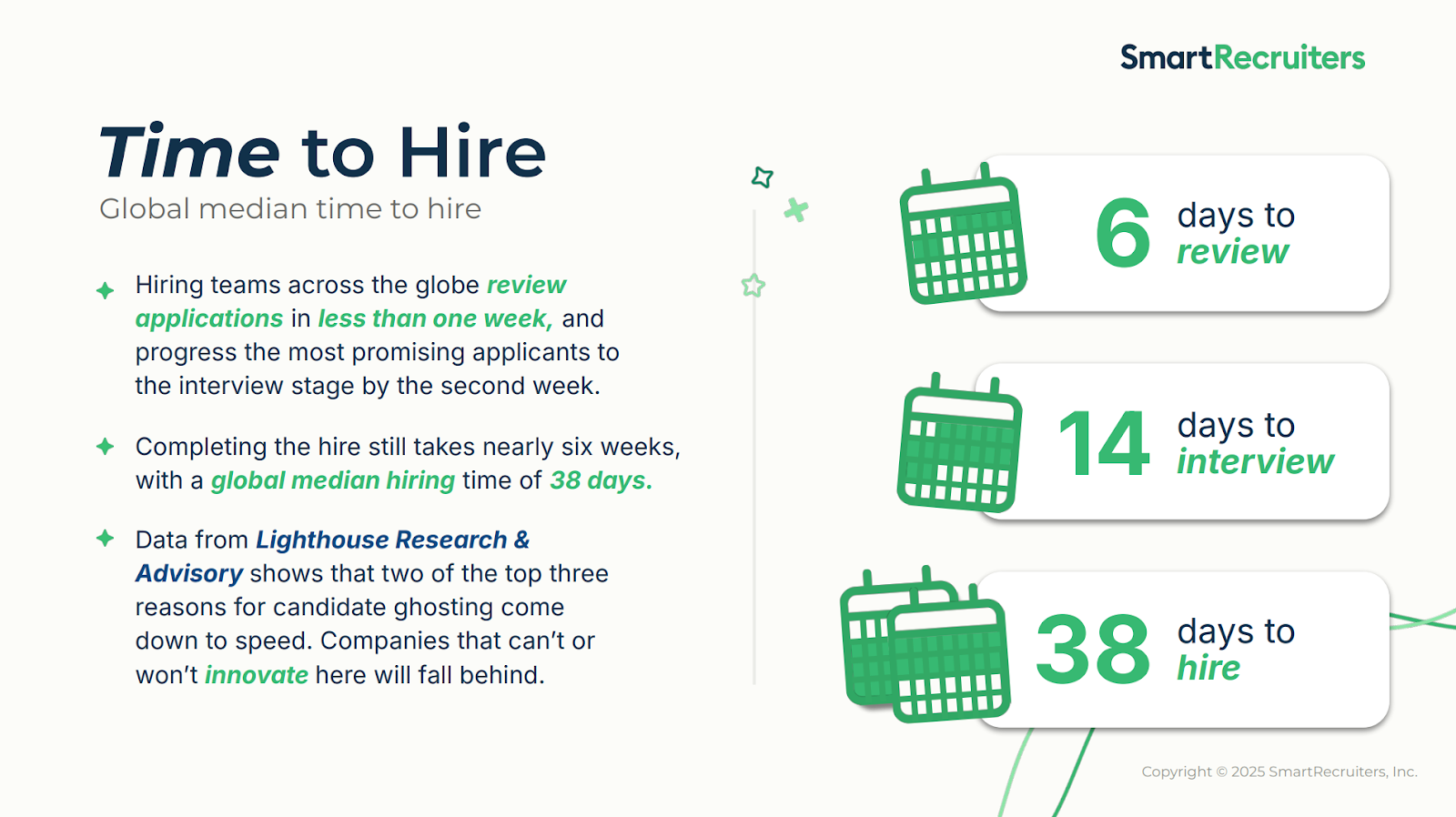
Instead of waiting for entity registration, tax IDs, and local legal approvals, you can onboard the best talent in as little as 24 hours using the EOR’s existing infrastructure and technology.
Imagine you’re a rapidly growing fintech company about to launch in Asia.
You find a brilliant customer success lead in Singapore, but setting up a local entity to hire them would take 2–3 months.
With an EOR that uses AI-powered workflows (like Teamed), that fully compliant hire starts in under a week and gets paid in local currency.
For a scaling company, this can be the difference between losing top talent who drop out of slow HR processes and capturing market share early.
👉Example in action: Learn how Teamed’s local expertise helped property management company City Relay grow its team by 80%. No additional in-house human resources or compliance knowledge necessary.
Simplified compliance and reduced legal risk
An EOR takes on employer responsibilities (e.g., staying compliant with local labour, tax, and HR regulations) and reduces the risk of fines and legal disputes.
With peace of mind and fewer disruptions, you can focus on building teams and expanding into new markets without fear of compliance errors.
Say you’re a mid-sized analytics provider expanding into Spain and Brazil (the latter being one of the top 10 most complex jurisdictions for doing business).
Each country has different rules for:
- Employment contracts. Requirements around holidays, notice periods, and termination clauses.
- Visas and background checks. Country-specific documentation, work permits, and verification processes.
- Benefits administration. Health insurance, social security contributions, and statutory leave policies.
- Payroll processing and reporting. Local tax filings, deductions, and timely payments in local currency.
While managing all of this internally could easily lead to costly mistakes, local experts who understand the nuances of each market back EORs.
You still manage your team’s work and goals. But the legal and administrative burden is off your plate.
Flexibility to test new markets
A quality EOR lets you hire locally without committing to a full entity. Use one to test market entry, validate your product, and explore customer demand without long-term overhead.
According to PwC research, 65% of British CEOs are actively planning to enter new markets (most notably, the US).

Rapidly growing businesses can use EORs to test multiple markets safely and strategically, learning what works before committing to a full legal presence.
For example, you may want to hire a small sales and support team to see if the Mexican market is viable.
Setting up a permanent establishment would take months and tens of thousands of pounds.
With an EOR, you can scale your team up or down quickly based on early results, experiment with different roles, and adjust your approach as you learn.
💡Pro tip: With software like Teamed, you’ll also save around £20,000 per country on setup costs and maintain full legal compliance.
How to choose the right EOR provider for your unique needs
The best EOR for your business depends on where you’re hiring, how fast you’re growing, and the level of support you need.
Whether you’re expanding into one new country or 10, a little structure in your decision-making process helps you narrow your options and find a provider that truly fits your needs.
Here are five crucial steps to do so successfully.
Step 1: Determine your hiring and compliance needs
Before choosing an EOR, it’s essential to clarify exactly why you need one and what problems you want it to solve.
Start by outlining your target markets, expected headcount, and legal or payroll requirements.
Say you’re planning to hire five employees in France and 20 in Canada. France requires strict employment contracts and local benefits, while Canada’s payroll taxes vary by province.
Knowing this upfront helps you find a partner with the right country coverage and expertise in both markets (saving you compliance headaches later).
You likely need an EOR if you’re:
The clearer you are about your hiring and compliance needs, the easier it will be to compare providers, avoid hidden surprises, and select an EOR that fits your growth strategy.
To work out these requirements, ask questions and discuss the answers with your team.
For example:
- What roles and number of employees do we need in each country?
→ This helps estimate costs and identify providers with the right expertise.
- Are there any industry-specific regulations that affect compliance?
→ Sectors like healthcare, fintech, and life sciences have stricter rules around contracts, certifications, and data handling.
- What’s our desired level of control vs. delegation?
→ EORs can simply handle basic payroll and legal responsibilities. Or you can request onboarding, competitive benefits, and HR support.
By treating this initial research step like a blueprint for your entire hiring process, you’ll be more likely to choose an EOR that helps you scale globally with confidence.
👉Example in action: Learn how Web3 company Luganodes added 50% to its international workforce in a highly regulated industry. Teamed’s affordable, scalable systems (that also handled crypto payments) were a no-brainer.
Step 2: Create a list of suitable EOR providers
The best-fit EOR for your business depends on your company size, industry, and growth goals.
Taking the time to find providers that actually fit your situation — not just the biggest names — saves you from expensive missteps later.
The right match leads to:
- Smoother onboarding
- Fewer compliance issues
- A better experience for every person on your global team
For example, European jurisdictions (like Greece) are highly complex. It’s no wonder McKinsey research indicates that European hiring is only successful around 46% of the time.
But it’s also why many US-based companies partner with providers who have a deep understanding of local employment laws.
That specific expertise makes a huge difference in avoiding regulatory gaps.
Once you have a clear idea of your hiring and compliance needs, arrange demos with promising EORs and ask targeted questions:
Imagine you’re the HR lead at a 300-person software company scaling into Australia and New Zealand.
You’ve hired your first few employees through an EOR.
But after a few months, you notice costs creeping up and minor compliance differences between countries creating confusion.
These issues are common and fixable with the right approach.
Transparency, strong communication, and proactive planning turn any potential roadblocks into opportunities to build a stronger, more scalable company.
EOR FAQs
Q: What doesn’t an EOR do?
A: An EOR doesn’t replace your HR team or manage day-to-day performance. You still direct global workforce management, culture, and goals.
The EOR handles global payroll, legal employment laws, and compliance in each new country — like a legal and administrative backbone.
Q: What are some common misconceptions about EORs?
A: Many assume EORs are only for startups or short-term hiring. But a quality provider like Teamed supports global expansion plans (from contractors to EOR to full entity), so you can scale without disruption.
Another misconception is that EORs remove control. They actually add structure and confidence in compliance, so you can focus on leading your team.
Q: What’s the difference between an EOR and setting up a local entity?
A: Setting up an entity gives you a permanent legal presence in a country. However, it can take months and cost thousands in registration fees, local tax filings, and legal expenses.
An EOR lets you hire in days — use its existing infrastructure while staying fully compliant. Later, if you outgrow the EOR model, a service like Teamed’s GEMO helps you move to entity ownership without rehiring or disrupting your team.
Choose a human-led EOR like Teamed that scales alongside you
The right EOR lets you hire fast and focus on growing your business without getting bogged down in legal or admin work.
To maximise your investment, look for a provider that offers AI-powered automation, hands-on human support, and transparent pricing.
Plus, the ability to seamlessly transition from EOR to complete entity management as your company expands.
Book a call today and join 1,000+ scaling teams like Globant and Eventbrite who rely on Teamed to grow globally with minimal effort.



